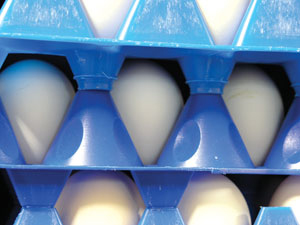
WHAT'S HATCHING
C&D Requirements Explained
If a contagious disease should occur on a Canadian poultry operation, the Canadian Food Inspection Agency has strict guidelines that must be satisfied for cleaning and disinfecting (C&D) the barn once the birds have been destroyed. Problem is, farmers are left to do this on their own – and it’s not an easy job, physically or mentally.

|
If C&D doesn’t meet CFIA standards, the process must be completed again – meaning more downtime for an affected farm and a prolonged delay in getting back to business.
That’s why the Egg Farmers of Ontario (EFO) and eBiz Professionals Inc. have created a comprehensive video and manual for producers that demonstrates exactly what is required of a poultry operator with regard to C&D. The video also explains what to expect with regard to destroying and removing birds from infected facilities and biosecurity measures that must be in place during the entire process.
“A key purpose of the video is to get the attention of the industry,” says Mark Beaven, EFO’s director of operations. “We do not exaggerate in this video, and it does have a significant impact.”
Beaven says producers’ emotional health is a big concern. He says that in a real situation, “you can’t fathom the stress level.”
The video has two parts. The first part is a powerful depiction of how the barn is prepared for gassing, and how a farmer needs to be prepared to walk inside to an eerily quiet environment once gassing is complete. The second part of the video demonstrates the CFIA requirements for dry and wet cleaning and disinfection. This part of the video matches the accompanying manual, so that producers have a visual representation of written protocols and how they should be done properly.
The video was filmed during an AI simulation on an Ontario farm last winter using spent hens and with the participation of the CFIA, other feather boards in Ontario, and OMAFRA. The video and manual are being distributed to EFO members in November. Distribution to other boards in Ontario and across Canada will occur throughout the fall.
For more information, call Mark Beaven at EFO and visit www.agbiosecurity.ca
New Veterinary College Opens
Alberta
The University of Calgary’s faculty of veterinary medicine welcomed its inaugural class of 34 students last month. Although a state-of-the-art clinical skills building at the pastoral campus in Spy Hill won’t be finished until February, students will be kept busy in other areas on campus.
The program, first estimated to cost $60 million, then $84 million, will top out at $100 million in infrastructure and supplies.
It is the fifth veterinary school of medicine in Canada and specializes in large animal care – horses and cows and other domestic species, including food animals.
It will be closely linked with the U of C’s medical faculty in an effort “to address the most pressing health challenges in this country,” the link between public and animal health, noted university president Harvey Weingarten.
New PRC Website
The University of Alberta’s Poultry Research Centre (PRC) recently launched a new website: www.poultryresearch centre.ca.
The new site features researcher and associate biographies; research publications and technical resources; information on the PRC and its facilities and people; current projects; directory; members area; search engine, and more.
New Ethanol Plant
Saskatchewan

|
With an expected output of 150 million litres of wheat-based ethanol and 163,800 tonnes of dried distillers grains annually, a new ethanol plant in Belle Plaine, Sask., will be one of the largest in North America.
Company president Tim LaFrance says the Terra Grain Fuels facility cost $1.3 million to build and was worth every penny.
He says it’s good for its proximity to wheat suppliers and has excellent infrastructure for utilities. He also says it is rare in that it is also tied into two major railway systems.
The plant, on which construction began in October 2006, is currently running at 80 per cent capacity. It started receiving grain last August.
Golden Valley Purchases Sunshine Eggs
British Columbia

|
Golden Valley Foods Ltd. of Abbotsford, B.C., has announced the purchase of the egg distribution business of Sunshine Eggs from Kamloops, B.C., effective Aug. 15, 2008.
Sunshine Eggs is an established and respected egg grader located in the Okanagan region of B.C., serving primarily local retailers, wholesalers and the food service industry.
Golden Valley Foods Ltd. has been servicing the B.C. food industry with a variety of quality shell and processed egg products since 1950. This purchase will allow for further expanding Golden Valley’s egg distribution business into the dynamic and growing market of the Okanagan in B.C.
Introducing Novogen
Groupe Grimaud has established a new company, Novogen, focusing on the genetic selection and distribution of layer breeding stock. Novogen is a company under French law, with its headquarters at Quintin, Bretagne in France. Groupe Grimaud is the majority shareholder of Novogen.
Under the general management of Mickael Le Helloco, Novogen S.A.S. focuses on genetic selection, the core business of Groupe Grimaud, and the worldwide distribution of layer Grandparent Stock and
Parent Stock.
Novogen offers competitive layer breeds for the brown, white and tinted egg production adapted to
the different market segments, including both alternative and conventional (cage) markets.
Hands-on Breeder Workshop
 |
Aviagen recently teamed with The University of Alberta to present a three-day workshop at the university’s Poultry Research Centre in Edmonton. The course titled “Managing the Modern Broiler Breeder” was designed for people working in the broiler hatching egg industry and focused on maximizing the production of fertile eggs from broiler breeder flocks.
In addition to co-sponsoring the event, Aviagen also provided many of the speakers for the workshop. Other industry professionals from the U.S. and Canada also presented at the seminar. The presentations balanced theory and practice effectively. One of the strengths of this event was that it was a hands-on workshop, not just a series of lectures. Farmers, industry representatives, speakers and graduate students donned protective clothing and participated in lab sessions on female evaluation, male evaluation and egg quality.
Print this page